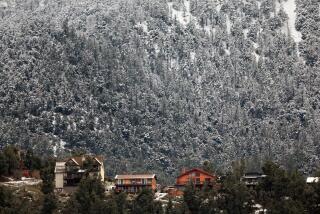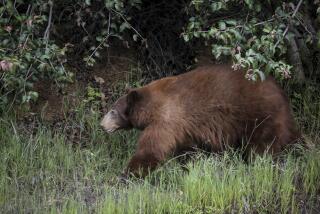Food Shortage Perils Colorado Bear Cubs
- Share via
DENVER — Half of the black bear cubs will not make it through hibernation this winter because they didn’t get enough to eat and don’t have the built-up fat of adult bears, Colorado’s top bear researcher said.
The food shortage in some parts of the state also means stressed females won’t have as many young next spring, state Division of Wildlife biologist Tom Beck said.
And, he said, this summer’s nuisance bear problems are likely to be next year’s problems too. The record 131 bears killed by law enforcement and others this year underscores the need to take steps to discourage bears from staying around people, he said.
A late freeze and then a drought destroyed a lot of the bears’ food in some parts of the state. That sent some bears scurrying for food among people. Other bears were tempted by garbage cans, pet food left outside and dirty barbecue grills.
Wildlife officers relocate a bear the first time it crosses people’s paths. The second time, they shoot it.
“People are going to have to make fundamental changes in the way they live,” said Wildlife Division spokesman Todd Malmsbury. “Otherwise, we will continue to have problems, and there will be growing pressure to dramatically reduce or eliminate bear populations in some areas.”
In a normal year, no cubs die while in their dens. But this year, only half may survive. And next year’s crop of cubs will plummet as pregnant females reabsorb their undeveloped embryos because of an instinct that they cannot support them.
Beck said this natural population control will “reset the clock” on a lot of breeding-age females, which breed every three years. Females who forgo birthing this year will be ready to breed again next year.
“It puts all these females back in synchrony, so if we get a good food year in 2001, man, we’ll have a pile of cubs in 2002,” he said.
More to Read
Sign up for Essential California
The most important California stories and recommendations in your inbox every morning.
You may occasionally receive promotional content from the Los Angeles Times.













